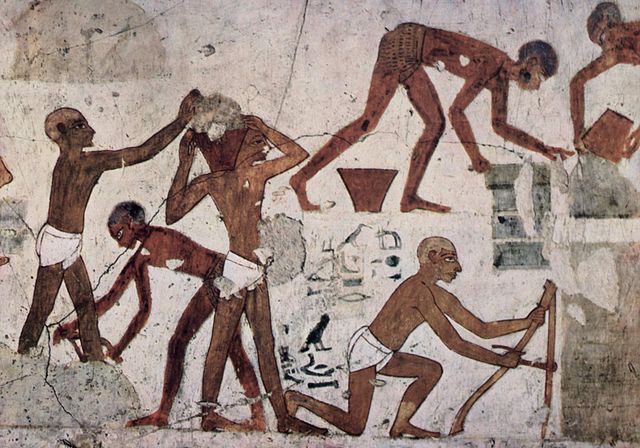|
Can very low-level work be dignified? Why shouldn’t bosses exploit employees to maximize profit? Why shouldn’t employees do as little as possible? Let’s learn from Paul’s teachings for first-century slaves and masters.
But first, did Paul condone slavery? During Paul’s time, slaves were servants by contract. It was not based on race, nor was it a permanent position. Slaves could own other slaves and properties. Many were war captives. In Ephesians 6:5-9, Paul focuses on how slaves and masters should behave in such a social structure, not whether there should be such a structure. In fact, following Paul’s teaching would end the slave system. Early churches were filled with slaves who worked in humiliating and painful environments. Paul treated them with respect, addressing them first. Paul told the slaves to obey and serve their masters wholeheartedly, as if they were serving the Lord, because the Lord would reward each one for the good they do. Then Paul said something totally against the norm. He told the masters to treat their slaves the same way. He also added that God wouldn’t show favoritism to anyone. Before God, masters and slaves are equal, both made in His image, saved by grace, not works. Their status does not depend on their work, but rather on being God’s children. Naturally, each should treat the other with respect and serve each other; God will reward them for the good they do. If bosses have such attitudes, they will treat their workers well. And workers will not work only when their bosses are around. Such attitudes would end the slavery structure during Paul’s time. Centuries later, during the abolitionist movement, Christians vigorously pushed for abolishing a different type of slavery. As to the workers themselves, they are dignified no matter their rank. During the Reformation, Martin Luther argued that different types of work can all be callings from God. Milkman, housemaid, lumberjack, monk, or priest—all can enhance human flourishing. We are equal before God. Our status is based on being God’s children. Our value comes from God, not our work. Both bosses and employees should respect and serve each other. God will reward the good work we do. All kinds of work can be dignified, as all can help people flourish. Summarized from a Tim Keller sermon: https://gospelinlife.com/downloads/our-work-and-our-character-6099/ 工作中的尊严 从事基层工作可以得到尊严吗?为什么雇主不可靠剥削员工来得到最大的利润?为什么员工不应该做工只是得过且过? 让我们学习保罗对第一世纪时主仆关系的教导。 但首先的问题是保罗支持奴隶制度吗? 在保罗的时代奴隶的身份不是基于种族,也不是永久性的,他们是按合同聘用的仆人。奴隶也可以拥有其他奴隶和财产。当时许多奴隶都是战俘。 保罗在以弗所书6:5-9关注奴隶和主人在这种社会结构中应如何行事为人,而不是应否有这种结构。实际上如按照保罗的教导而行,这种结构迟早会结束。 早期的教会里有许多的奴隶,他们都在羞辱和痛苦的环境中劳作。 保罗尊重奴隶, 在这段经文中先对他们讲话。 保罗告诉他们要听从主人,全心全意地为主人服务,好像服侍上帝一样, 因为上帝会因此奖赏他们。 然后保罗说了些完全违背当时社会规范的话。他告诉主人们也要以同样的方式对待奴隶,还补充说上帝不偏爱任何人。 在上帝面前主人和奴隶是平等的,都是按照上帝的形象被造,靠恩典而不是靠行为得救。因此他们的地位并不取决于工作,而取决于作为上帝儿女的身份。所以必须互相尊重,彼此服务。上帝会因他们的善举奖励各人。 有了这样的态度主人就会善待仆人,仆人也不会只有主人在身边时才工作。 如果当时的社会都采纳这种态度就可终止保罗时期的奴隶制度。许多世纪以后的废奴运动中,基督徒确实大力地推动废除另一种类型的奴隶制度。 至于工人本身,无论从事高尚还是低层的工作都应得到尊严。 马丁路德在宗教改革期间辩论到不同类型的工作都可以是上帝的唤召, 挤奶工人、女仆、柴夫、僧侣或牧师都可以促进人类的繁荣。 总而言之, 我们在上帝面前都是平等的。 我们的地位是基于上帝儿女的身份, 我们的价值来自上帝而不是工作。雇主和员工都应彼此尊重和服务对方。 上帝会因我们所做的事奖赏我们。 高层或低层的工作都可得到尊严,都能促进人类的繁荣。
0 Comments
Leave a Reply. |
Categories
All
|
Proudly powered by Weebly
